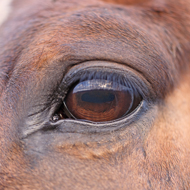
Reactions to photographs studied by psychologists
Horses are able to distinguish between happy and angry human facial expressions, according to a study by the University of Sussex.
Psychologists studied the reactions of 28 horses when they were shown photographs of happy and angry human faces.
When they saw the angry faces, the horses looked more with their left eye - a behaviour that is associated with viewing negative stimuli.
Research has previously shown that many species, including dogs, view negative events with their left eye. Information seen with the left eye is processed by the right brain hemisphere, which specialises in processing threatening stimuli.
While looking at the photographs of angry faces, the horses' heart-rate also increased more quickly and they showed more stress-related behaviours.
Researchers say this effect of facial expressions on heart rate has not been seen before in interactions between humans and animals.
"It's interesting to note that the horses had a strong reaction to the negative expressions but less so to the positive," said researcher Amy Smith, a doctoral student at the Mammal Vocal Communication and Cognition Research Group.
"This may be because it is particularly important for animals to recognise threats in their environment. In this context, recognising angry faces may act as an early warning system, allowing horses to anticipate negative human behaviour such as rough handling."
Co-lead author Karen McComb said horses may have developed an ancestral ability to pick up on emotional signals in other horses, to respond appropriately to human facial expressions.
"Alternatively, individual horses may have learned to interpret human expressions during their own lifetime," she added. "What’s interesting is that accurate assessment of a negative emotion is possible across the species barrier despite the dramatic difference in facial morphology between horses and humans."
Further work by the team will examine the relationship between a range of emotional skills and social behaviour.
Read the full study here: http://rsbl.royalsocietypublishing.org/content/12/2/20150907



 The latest
The latest